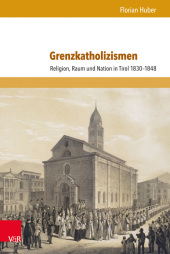 Neuerscheinungen 2016Stand: 2020-02-01 |
Schnellsuche
ISBN/Stichwort/Autor
|
Herderstraße 10
10625 Berlin
Tel.: 030 315 714 16
Fax 030 315 714 14
info@buchspektrum.de |

Florian Huber
Grenzkatholizismen
Religion, Raum und Nation in Tirol 1830-1848. Dissertationsschrift
2016. 426 S. mit 8 Abbildungen. 23.2 cm
Verlag/Jahr: V&R UNIPRESS 2016
ISBN: 3-8471-0574-4 (3847105744)
Neue ISBN: 978-3-8471-0574-9 (9783847105749)
Preis und Lieferzeit: Bitte klicken
Von der Grenzregion zum "Heiligen Land": Tirol 1830-1848 als religiöses Laboratorium der Moderne
Im Vormärz veränderten zentralstaatliche Durchdringung, mediale Innovation, wirtschaftlicher Wandel, neue politische Ideen und "religious revivals" die Gesellschaften Europas grundlegend. Grenzräume wie das Kronland Tirol im Westen der Habsburgermonarchie waren dem in besonderem Maße ausgesetzt. Hier prallten "deutsche" und "italienische" katholische Kulturen aufeinander. Deutschsprachige Ultramontane im Norden und liberale Katholiken im italienischen Süden Tirols stellten sich anders zum modernen Staat und verfolgten unterschiedliche Gesellschaftsentwürfe. Für beide aber war Religion das zentrale Bindeglied zur übergeordneten Kulturnation. Die Studie verbindet Ansätze der borderland studies mit religions- und medienhistorischen Fragestellungen und zeigt, wie sehr katholizismusgeschichtliche Untersuchungen von transnationalen Perspektiven profitieren können.
The Vormärz can be read as a phase of profound change: enforcement of the central government, media innovation, economic change, new political ideas and religious revivals fundamentally changed Europe´s society. Border regions were particularly affected, as was Tyrol, a crownland in the western part of the Habsburg Monarchy, where the "German" and "Italian" catholic cultures clashed as a result of their starkly different reactions to the "impositions of modernity" (R. Schlögl). German-speaking Ultramontanes in northern Tyrol and liberal Catholics in the Italian-speaking south had diverging relationships with the modern state and pursued different models of society. For both branches of Catholicism religion was the central link to their respective nationalities. The study combines the core approaches of borderland studies with religious and media history and shows how historical studies of Catholicism can benefit from transnational perspectives.
Huber, Florian
Dr. Florian Huber ist seit 2013 Wissenschaftlicher Mitarbeiter am Kompetenzzentrum für Regionalgeschichte an der Freien Universität Bozen.


